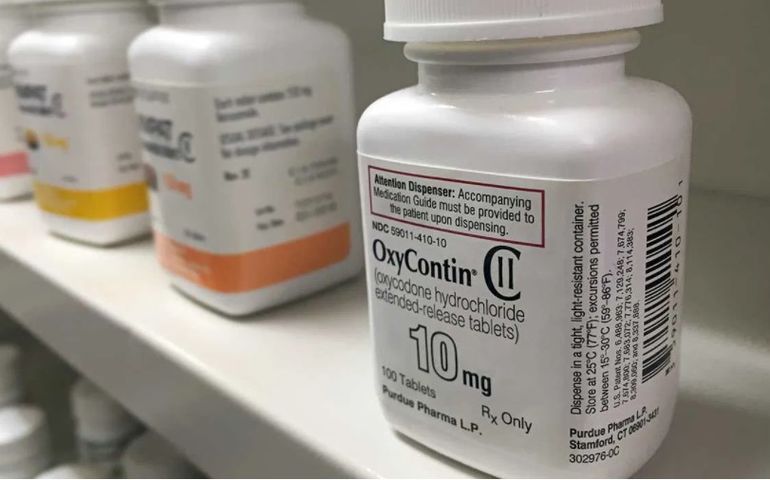
Processing Your Payment
Please do not leave this page until complete. This can take a few moments.
Feds settle charges against OxyContin maker for $8.3B, but Maine presses suit
 Courtesy / Healthline
OxyContin, a long-acting form of oxycodone, has been produced and marketed since 1995 by Purdue Pharma, headquartered in Stamford, Conn.
Courtesy / Healthline
OxyContin, a long-acting form of oxycodone, has been produced and marketed since 1995 by Purdue Pharma, headquartered in Stamford, Conn.
While federal prosecutors this week accepted an $8.3 billion settlement of criminal and civil charges against Purdue Pharma LP over its role in sparking the opioid drug crisis, Maine has a score to settle.
The settlement includes the largest criminal fines in history against a pharmaceutical manufacturer, totaling $5.5 billion, and guilty pleas by Connecticut-based Purdue to three criminal violations of federal fraud and anti-kickback laws.
In addition, Purdue will pay $2.8 billion to resolve a civil charge of violating the federal False Claims Act, the U.S. Department of Justice said. The Sackler family, which owns Purdue, will pay $225 million under a separate action.
“Purdue, through greed and violation of the law, prioritized money over the health and well-being of patients,” said FBI Assistant Director Steven M. D’Antuono in a DOJ news release Wednesday.
Yet the settlement doesn’t resolve lawsuits by Maine and over 20 other states that claim Purdue deceptively marketed its prescription opioid pain reliever, OxyContin, causing widespread addiction and thousands of deaths.
Maine Attorney General Aaron M. Frey vowed the state will continue its legal fight.

“Our efforts to provide justice and relief for Mainers harmed by the opioid crisis will not be impacted by today's announcement from the U.S. Department of Justice,” Frey said in a statement Wednesday.
“The announced settlement is insufficient for the damage done by Purdue and the Sackler family, and I will continue to work with attorneys general across the country to achieve the accountability that the people demand."
That demand may be especially strong in Maine, where Frey’s office this week also released data showing that 132 Mainers died of drug overdoses from April to June — more than in any other quarter since at least 2009.
During the first six months of 2020, 16 Maine residents died from overdoses of oxycodone, a medication almost chemically identical to heroin and sold most widely as OxyContin. Between 2007 and 2018, nearly 500 people in Maine died from oxycodone.
Nationwide, more than 400,000 people have died from opioid drugs of all types since 1999.
Meanwhile, evidence shows Purdue’s sales tactics were targeting Maine specifically, and effectively.
In the crosshairs
Maine’s suit, filed in June 2019, claims Purdue and the Sackler family “designed, financed and waged a campaign to mislead prescribers, patients and the public into believing their opioid drugs were safe to treat pain on a long-term basis.”
For example, Frey claims, Purdue distributed written materials in Maine that misrepresented how addictive prescription opioids can be. From January 2008 and August 2017, Purdue distributed 3,483 different pieces of marketing material to Maine health care professionals, according to the complaint, including 2,000 copies of a single brochure.
The company also nearly doubled its sales staff here. And over a three-year period, Purdue spent $65,000 in cash payments and food purchases for health care professionals in the state, the suit alleges.
What’s more, Purdue worked with a Boston medical school to promote opioid prescribing in Maine — at the very start of the opioid epidemic.
In 2000, Purdue obtained an agreement from Tufts University Medical School to sponsor programs “in response to the situation in Maine,” according to documents cited in another lawsuit against Purdue, this one filed in January 2019 by Massachusetts.
“Purdue and the Sacklers knew of damning reports of addiction and overdose in Maine caused by Purdue’s opioids. Tufts ran a residency program for family practice physicians and agreed to help Purdue find doctors to attend an event where Purdue could defend its reputation.”
While the event isn't cited in the Maine suit, an investigation by Tufts seems to confirm the claim. A report issued last December by the university said that Purdue, a longtime donor, paid $78,00 to develop at least three such events in Maine during 2000.
Ultimately, according to Frey's complaint, Purdue ramped up sales activity in Maine so aggressively that in 2012 the state’s health care providers wrote prescriptions for long-acting opioids including OxyContin at the highest rate in the nation: 21.8 prescriptions for every 100 Mainers.
That level of prescribing is also demonstrated by other sources.
Bangor, Auburn and Lewiston ranked as the New England cities with the highest per capita rates of prescription opioid distribution from 2006 to 2012, according to data compiled by the Worcester Business Journal, a Mainebiz sister publication. More prescription opioid pills were distributed in that time to Bangor pharmacies, 27.4 million, than in Boston, with a population 22 times larger.
In 2018 Maine ranked among the 10 U.S. states with the highest per capita rates of opioid prescriptions written, and recorded the highest rate in New England, 48.1 scripts per 100 residents, according to the U.S. Centers for Disease Control and Prevention.
A battle on many fronts
Besides the federal government, Maine and Massachusetts, every state but Michigan and Nebraska has sued Purdue on similar grounds. There have also been suits by the District of Columbia, several U.S. territories and over 2,000 cities, counties, tribal organizations and other entities.
In September 2019, Purdue reached a settlement with some of them, calling for the Sackler family to give up control of Purdue and pay $3 billion. Facing potential damages of $2.15 trillion, the company also petitioned for bankruptcy protection and agreed to become for-profit trust whose entire assets would be awarded to the plaintiffs.

That settlement has been valued at $10 billion to $12 billion, but only half the plaintiff states have agreed to it. Maine is not one of them.
In a statement regarding the federal deal, Purdue Chairman Steve Miller said, "Resolving the DOJ investigations is an essential step in our bankruptcy process. The settlement agreement will pave the way for Purdue to submit a plan of reorganization to the bankruptcy court that will transfer all of Purdue’s assets to a public benefit company, and ultimately deliver more than $10 billion in value to claimants and communities.”
In addition to holding out on a settlement, Maine and 23 other states are objecting to the bonuses Purdue has planned to pay its executives.
Frey and other attorneys general last year joined a federal legal complaint over $38 million Purdue execs may receive in incentives, bonus and severance plans, despite the bankruptcy and pending litigation.
“These bonuses are yet another example of how Purdue’s executives, including the Sackler family, continue to seek to profit the opioid crisis,” Frey said at the time.
On Wednesday, he summarized the state's goals in the ongoing legal battle by saying, "Currently we are litigating in bankruptcy court to ensure that Purdue and the Sacklers pay adequately for the damage caused by the opioid crisis, to ensure the orderly liquidation of the company, and to ensure that they may no longer sell OxyContin."












0 Comments